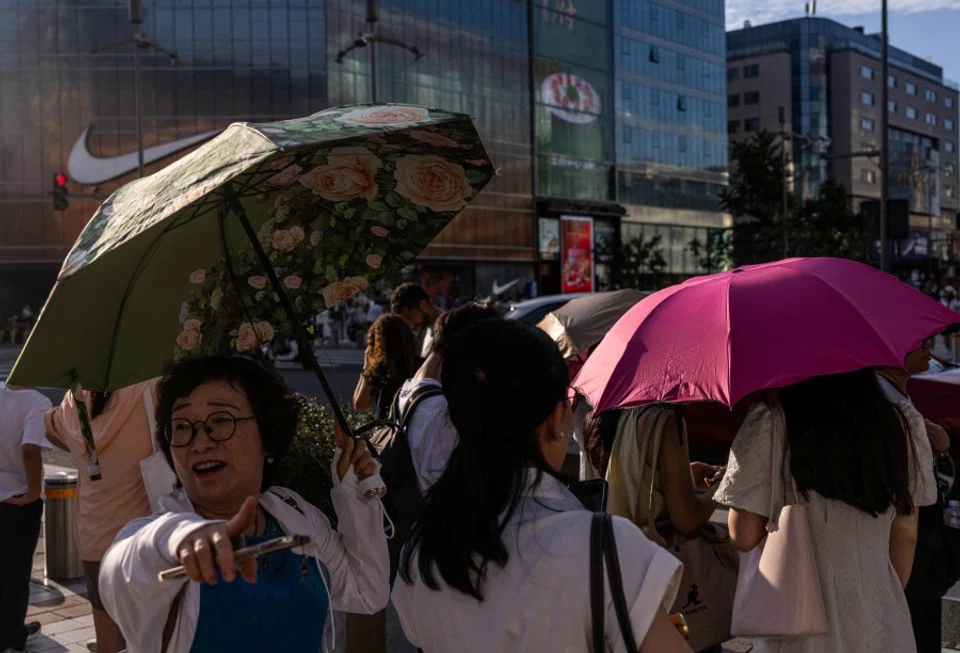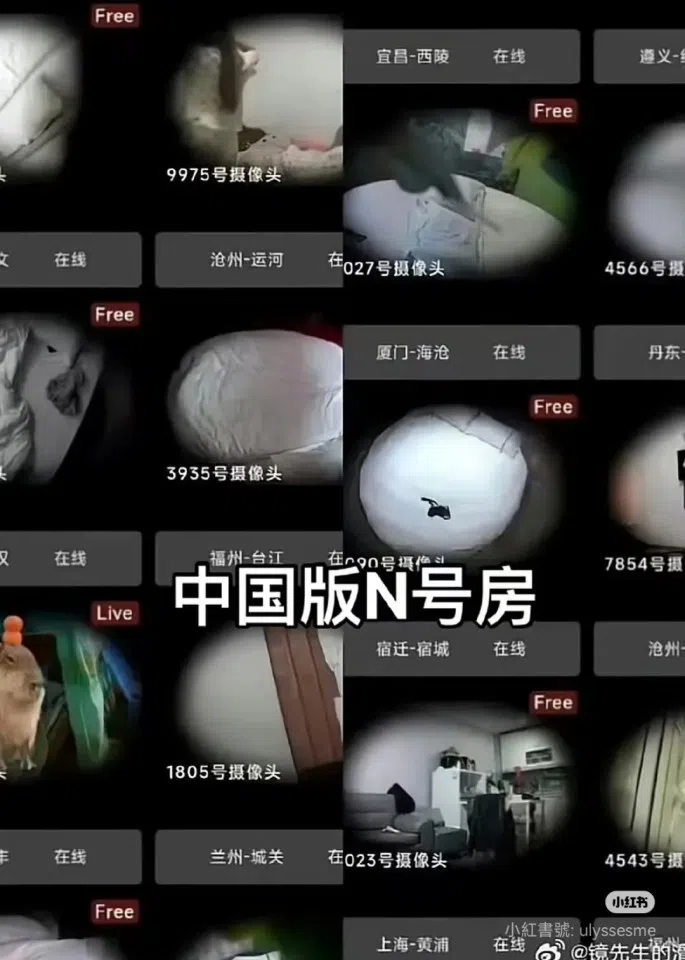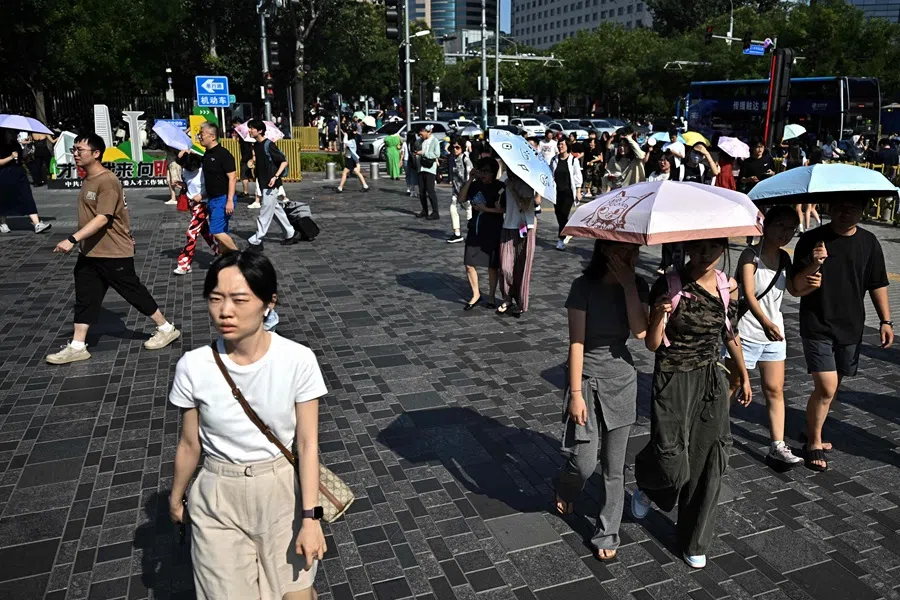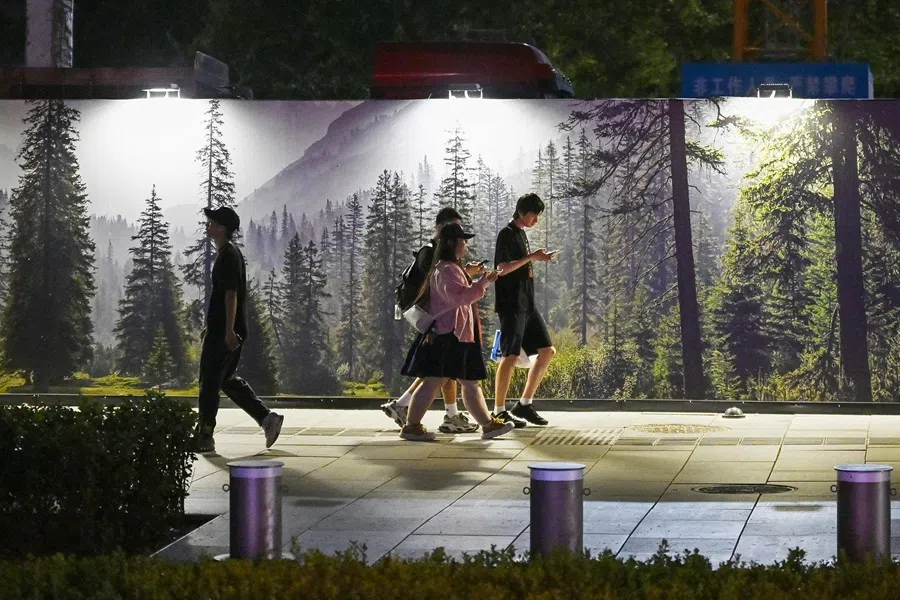No escape: How secret cameras haunt women’s lives in China
The persistent problem of covert filming highlights the broader challenges Chinese women face in defending their rights amid inadequate legal protections and lax platform oversight. In the face of such widespread violations, many victims are left with little recourse but to remain silent — and are instead forced to learn how to protect themselves. Lianhe Zaobao’s China Desk looks into the matter.

“A search is underway for a young woman with a tattoo ‘忍’ (endure) on her left hand! There are hidden cameras in your rented apartment — even in the bathroom!”
In early July, a missing-person-style post on the social media platform Xiaohongshu went viral. The poster warned that the woman’s rental apartment — including the bathroom — had been fitted with hidden cameras, and the footage was being circulated online.
Screenshots circulating online show that many forum members gain access to the group by secretly recording women around them.
According to Southern Metropolis Daily’s affiliated media “Southern City N Video” (南都N视频), the online group “MaskPark Tree Hole Forum” (MaskPark树洞论坛) has over 100,000 members made up of Chinese men, and hosts at least 20 pornographic sub-groups, some of which have over 220,000 subscribers.
According to whistleblowers online, the platform circulates content involving covertly filming unsuspecting women in various settings. Users also share private photos of their ex-girlfriends, current girlfriends, wives, daughters and even mothers. Even private videos of strangers are not spared.
Screenshots circulating online show that many forum members gain access to the group by secretly recording women around them.
A male whistleblower told Ta Kung Pao that methods of covert filming on such platforms include men disguising themselves as women to install pinhole cameras in women’s restrooms, or fitting miniature cameras onto their shoes to film up women’s skirts. These perpetrators often use specialised spy software, and avoid detection by storing the photos outside of their phones.

The whistleblower also revealed that some hackers claim they can hack into home surveillance systems. If they obtain a girl’s WeChat account, they can allegedly infiltrate her photo albums to find private images. These materials are then openly sold on the platform with listed prices.
... there are even more than a dozen chat groups dedicated to selling pinhole cameras. These cameras are disguised within everyday items like aroma diffusers, water bottles and power strips.
Insiders disclosed that because some of the secretly recorded videos can be sold for money, there are even more than a dozen chat groups dedicated to selling pinhole cameras. These cameras are disguised within everyday items like aroma diffusers, water bottles and power strips. Covert filming occurs in locations such as public restrooms, subways, shopping malls, and even hospital ultrasound rooms. The victims are not only adult women, but also children.
China’s version of ‘Nth Room’
Angry Chinese netizens have dubbed MaskPark “China’s version of the Nth Room”, drawing parallels to the notorious “Nth Room Incident” in South Korea.
The Nth Room case occurred between 2018 and 2020, during which perpetrators used the chat rooms in messaging platform Telegram to distribute and sell sexually exploitative images and videos coerced or tricked from women.
One Chinese netizen commented, “The Nth Room was evil you could count — in money, files and digital footprints. But MaskPark? That’s scarier. It’s the kind of evil that hides in plain sight, woven into everyday life. It means the bar for doing something this horrific is now terrifyingly low.”

Following the Nth Room scandal, South Korea saw mass protests and the implementation of judicial reforms. The two main culprits were sentenced to 40 and 34 years in prison respectively.
... no government departments have made any public statements or taken visible action to date.
In contrast, while the MaskPark incident has triggered widespread outrage online in China and drawn coverage from several media outlets, no government departments have made any public statements or taken visible action to date.
Victims’ struggle for justice
The MaskPark scandal trended on Weibo’s hot search list on 18 and 23 July, and remains a topic of intense public discussion. While the largest group has reportedly been shut down, others selling pinhole cameras remain active, and many smaller voyeurism groups still exist.
According to a Beijing News report, a victim identified as Ms D said that she received a private message from a stranger in May this year. The person claimed to have explicit photos and videos of her and sent her a link. She discovered that her ex-boyfriend had secretly filmed her during intimate moments and uploaded the footage to the MaskPark Tree Hole Forum. The perpetrator also spread her social media accounts.

Ms D’s ex-boyfriend is a Chinese Canadian working in the US. She said that after she found out he had secretly filmed her, she reported him to the police in his neighbourhood and sent a complaint email to the human resources department of his company, but she has yet to receive any response.
What was even more disheartening was that Telegram users are able to adjust the chat settings so that messages as well as images or videos cannot be saved or screenshotted, which makes collecting evidence even more difficult.
Complicating matters further, the platform’s servers are hosted overseas, while most victims are Chinese citizens — raising jurisdictional challenges and complicating efforts to pursue cross-border legal action.
Li Yubin, a senior legal expert in Beijing, told Ta Kung Pao that those involved are suspected of the dissemination of obscene materials, illegal use of eavesdropping and surveillance devices, indecency against minors, as well as infringement of citizens’ personal information, among other serious crimes. However, such cases are difficult to pursue, and evidence collection can be hard.
The Dahe Daily quoted lawyer Qie Qiaohui of the Jiangsu Fade Dongheng Law Firm, who explained that victims face numerous obstacles in seeking justice. The forum operates on an encrypted messaging app and uses anonymous mechanisms, making it difficult to trace user identities. Complicating matters further, the platform’s servers are hosted overseas, while most victims are Chinese citizens — raising jurisdictional challenges and complicating efforts to pursue cross-border legal action.
Many affected women remain unaware of the situation, while those aware could be reluctant to report and defend their rights due to psychological factors such as shame or fear of reliving the pain, which could hinder the investigation and pursuit of justice for such cases.

In response to an inquiry from Reuters, Telegram stated that its terms of service explicitly forbid the sharing of nonconsensual pornography, which will be removed upon discovery. Moderators also monitor public parts of the platform and remove millions of pieces of harmful content that are reported each day, including nonconsensual pornography.
Persistently filmed on the sly
In recent years, incidents of covert filming have become increasingly common in China. Hidden cameras found in guesthouses, hotels and rental properties regularly spark public outrage — but most cases end with only administrative penalties issued by public security authorities, with few escalating to criminal prosecution.
Article 284 of the Criminal Law of the People’s Republic of China states that the unlawful use of specialised equipment for eavesdropping or covert photography may result in up to two years’ imprisonment, short-term detention or non-custodial correction. However, legal experts have argued that the light criminal penalties do not reflect the severity of the crimes.
The law is also vague on the accountability of hotels, guesthouses, and other venue operators where such hidden cameras are often found, leaving room for illegal activities to exploit these legal grey areas.
During the 2020 Two Sessions — the annual meetings of China’s top political bodies — Hua Yawei, a member of the Chinese People’s Political Consultative Conference (CPPCC), called for criminal penalties targeting acts like secret filming. In 2022, Hua went further, proposing the addition of “privacy offences” to the Criminal Law. “The absence of criminal penalties for acts that seriously infringe on personal privacy, like secretly filming someone, has become a major loophole in our Criminal Law,” he stated.
That they must hope only their “perfect” moments are exposed — not because justice is served, but because the system fails them — is a brutal and deeply absurd indictment of how far society still has to go.

The persistent problem of covert filming highlights the broader challenges women face in defending their rights amid inadequate legal protections and lax platform oversight. In the face of such widespread violations, many victims are left with little recourse but to remain silent — and are instead forced to learn how to protect themselves.
Recently, the popular Chinese comedy show The King of Stand-up Comedy, comedian Huang Yijin expressed the anger and helplessness women felt when confronting being filmed on the sly.
She recalled how, at first, she would leave no stone unturned — scouring every corner of her hotel room for hidden cameras. But the effort was time-consuming and enervating, and it was a tall task to guard against being filmed secretly.
Ultimately, she gave up and went back to behaving normally in her room. “I now assume there are cameras in the room whenever I stay at a hotel. If my privacy is fated to be leaked, hopefully only the perfect parts are revealed.”
The sad truth is that many Chinese women are forced to accept this violation as an everyday reality, where the fight for privacy feels futile. That they must hope only their “perfect” moments are exposed — not because justice is served, but because the system fails them — is a brutal and deeply absurd indictment of how far society still has to go.
This article was first published in Lianhe Zaobao as “中国版“N号房” 偷拍者的树洞”.





